“That is half of your recovery, to have kind people around you.”

More than ever, health systems are faced with capacity constraints: staffing shortages, a growing population of older patients with medical needs, a lack of available beds and more. For patients like Micheline, a 78-year-old resident of Manhattan, NY, this can mean long wait times for admission when visiting the hospital for emergent medical problems. In response, many organizations see this as a unique opportunity to innovate care delivery.
A visit to the hospital leads home
On one Sunday afternoon in October, Micheline traveled to her local emergency room at Mount Sinai Hospital with severe symptoms of a urinary tract infection (UTI). “Unfortunately, they didn’t have a bed to admit me,” Micheline shared. What they did have, however, was an alternative: admission to Mount Sinai’s Hospitalization at Home, the health system’s hospital-level care at home program.
“I was questioning it,” she says of the offer to go home for care, because it was a new concept for her. “I said, ‘how can you do this?’”
But the nurse, a Recovery Care Coordinator with the program, explained in detail how the health system was able to bring hospital-level care home, providing everything needed for her medical care. Upon returning home, a nurse would visit Micheline twice each day, administer IV medications, draw blood as necessary and facilitate telemedicine visits with a physician. Micheline says the nurse told her, “We’re a phone call away, and you’re in the comfort of your own home.”
Micheline, who lives in the same apartment building as her son, asked him for his opinion. “He said, ‘Mom, yes! You can’t miss this!’” she recalls.
“Going home was heaven”
Micheline recalls during her wait in the hospital, it was difficult to get comfortable. As she waited for a bed, she says it was hard to get personalized attention, with so many patients needing help. “It’s not the hospital’s fault,” she explained. “They don’t have the time. It is heartbreaking to see all the doctors, nurses— even the people who clean up— they are overwhelmed.”
Mount Sinai’s solution to this challenge was the perfect answer for her situation. “For me, going home was heaven. The nurses came in and explained what we were going to do, and they were great. They were kind, they took their time, they explained to me what my problems were and what I needed to do.
“Coming home, first of all, to have all my things; and secondly to have nurses who took the time to talk to me… and if I wanted to cry, I could cry on their shoulders— it is a lifesaver.”
Care for the whole patient
Micheline appreciates that her care wasn’t just centered around her immediate needs, either. “They even took the time when my son had questions to talk to him and explain to him what they were doing, what the result of the blood tests were,” she says. And her meetings with the doctor helped her secure care beyond her stay in the program. “She helped me out with things for after my discharge, even my appointment with a urologist. I had a problem with that, and the next day they said, ‘you have an appointment on Monday.’ I was shocked.”
She believes the best part of the program is this holistic approach to meeting needs, noting, “If you are sick and in the hospital, when you come home it’s nice to know you will have that human side. That’s what the program offers. It is kind, it is human.”
She elaborated, “The kindness in them, I cannot even explain. It was like talking to someone I knew. It was like talking to my son or my daughter. That is half of your recovery, to have kind people around you.
“I don’t wish anyone to get sick or to need the program, but if they need it, I tell them, go for it. I recommend it 150%, I really do.”
